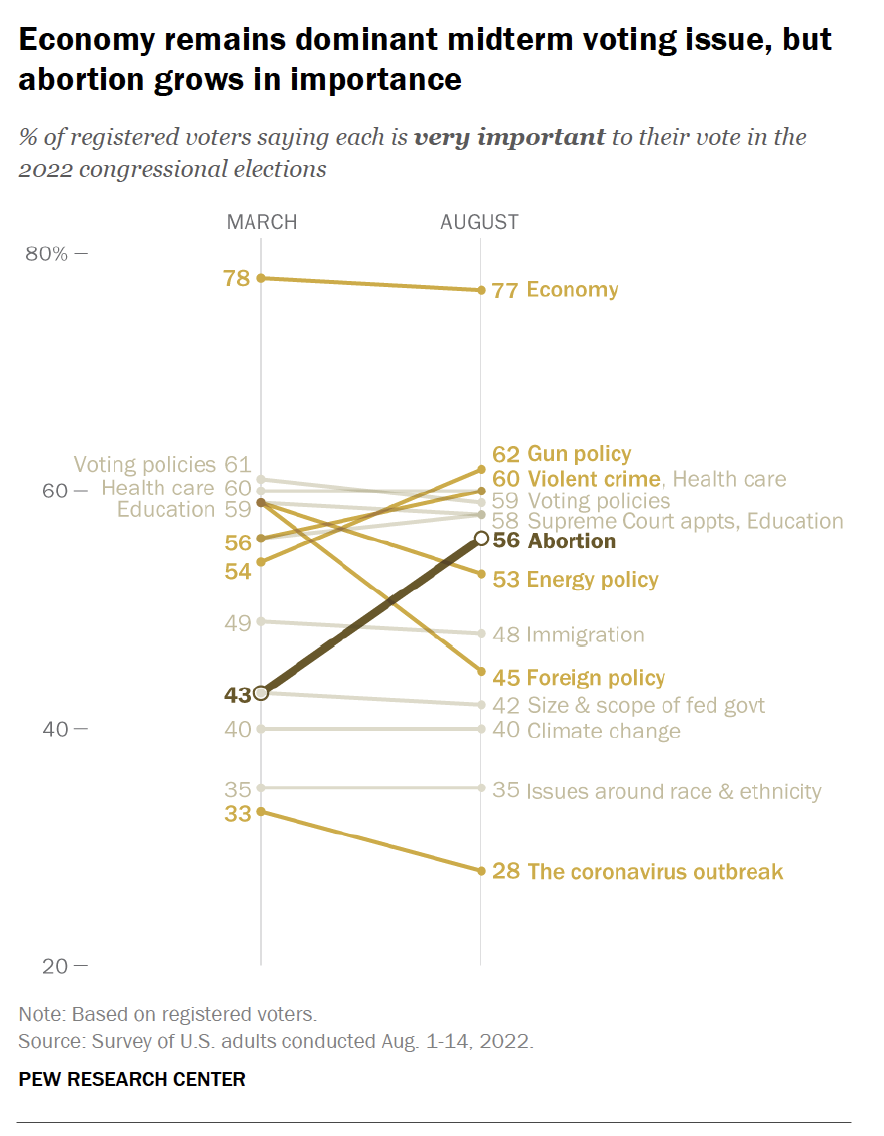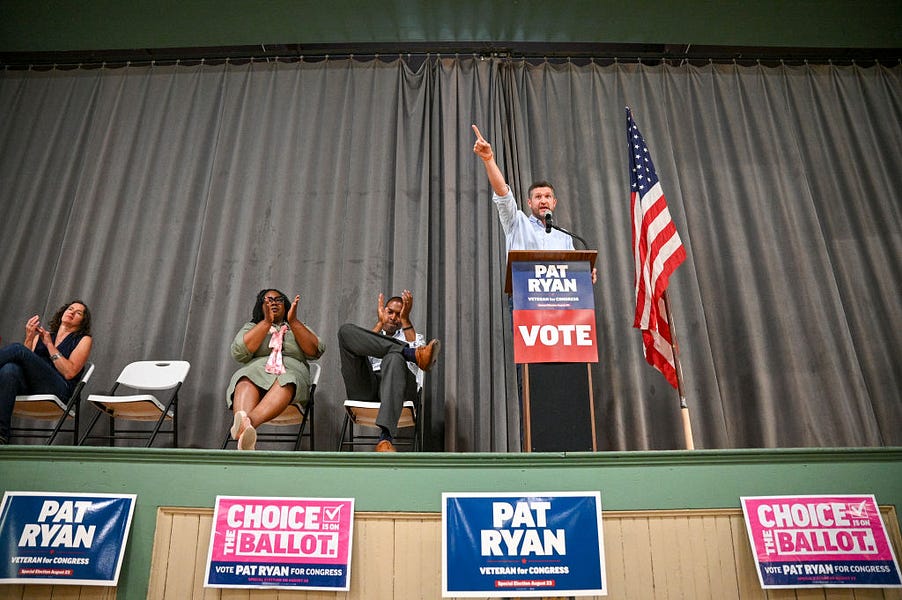Sarah’s out again this week, so you’re stuck with us!
Four Special Elections Dim GOP’s Hopes of a Red Wave
Gubernatorial races last fall left Republicans feeling pretty good about their chances of dominating the 2022 midterms. In Virginia, a state Biden won by 10 points in 2020, Republican Gov. Glenn Youngkin beat Democrat Terry McAuliffe by roughly two points and became the first GOP candidate to win a statewide race in the Old Dominion in 12 years. And in New Jersey—a state Trump lost by 16 points in 2020—Democratic Gov. Phil Murphy only defeated his Republican challenger Jack Ciattarelli by three points.
“I think there’s people who are potentially more interested in running than certainly there was yesterday morning,” a GOP operative working on Senate races told The Morning Dispatch a day after the Virginia and New Jersey races were called. “We need to hold on to the gains made among white working-class voters, we need to continue the trend of Hispanic voters coming to our side, and we need to win back some of the suburban voters that we’ve lost.”
Nearly a year later, the outlook isn’t as rosy for Republicans. FiveThirtyEight’s polling average has both parties roughly even on the generic ballot, and Democratic turnout in several special elections has been up since the Supreme Court overturned Roe v. Wade. The GOP’s long-anticipated red wave is looking “more like a ripple,” the Cook Political Report declared last week.
What gives? Candidate selection is weighing on Senate Republicans ahead of November, as Senate Majority Leader Mitch McConnell admitted earlier this month. But it’s impossible to overstate how much abortion alone has upended expectations in the months since the Supreme Court struck down Roe v. Wade in Dobbs v. Jackson Women’s Health.
In New York’s 19th District, Democratic candidate Pat Ryan focused his campaign on protecting “a woman’s right to choose”—and beat Republican challenger Pat Molinaroby two points in a special election last week. Molinaro focused on inflation. Election analysts attribute Ryan’s win to juiced turnout from Democrats in this swing district. From Kyle Kondik in Sabato’s Crystal Ball:
Higher Democratic voter enthusiasm likely explains Ryan’s victory. Ryan won just 2 of the county’s 11 whole or partial counties, his home of Ulster County (Kingston), which is the district’s largest source of votes, as well as Columbia County (Hudson) to its northeast. But these are also the 2 most Democratic pieces of the district, and each county made up a bigger share of the districtwide vote in this special election than they did in the 2020 presidential election. Dutchess, Molinaro’s home, also was up in terms of its share of the districtwide vote. Molinaro carried Dutchess after it had voted for Biden in 2020, so he did well there, and his percentage margins in some of the other, redder parts of the district were better than Donald Trump’s in 2020. But the redder parts of the district generally saw their share of the districtwide vote go down from 2020 as turnout was better in the blue areas.”
A similar dynamic played out last Tuesday in New York’s 23rd District. Democrat Max Della Pia lost to Republican Joseph Sempolinski by only 7 points—an underwhelming margin in a reliably red district that Biden lost by 11 points two years ago. Those New York races follow two special elections in Nebraska and Minnesota this summer, when two Democratic candidates significantly outperformed Biden.
“We’ve seen this in four special elections now since the Supreme Court ruling,” NBC and MSNBC national political correspondent Steve Kornacki said on Monday’s Commentary Magazine Podcast. “You would expect smaller turnout in a special election, but you would expect that the more motivated party would be the opposition party, and right now at least, we’re seeing that it’s the in-power party.”
Then there’s the Kansas ballot initiative to strip abortion rights from the state constitution, which failed by 18 points. For context, Trump carried the state by some 15 points in 2020.
“A majority of registered voters (56%) say the issue of abortion will be very important in their midterm vote, up from 43% in March,” a Pew Research Center poll conducted this month explains. “Virtually all of the increase has come among Democrats: 71% of Democratic and Democratic-leaning registered voters rate abortion as very important; fewer than half (46%) said this in March. By contrast, views among Republicans and GOP leaners have shown almost no change since then (41% now, 40% then).”
For our visual learners, here’s a graphic:

The election is still months away, and since Pew started collecting data for this survey the FBI searched Trump’s Palm Beach home, the Inflation Reduction Act passed, and Biden issued an executive order canceling some student debt. And that’s just during August, a slow news month when Congress is out of session and millions of voters are on vacation.
For now, 65 percent of Republicans and 62 percent of Democrats say they are “extremely” or “very” enthusiastic about casting their vote this midterm cycle, according to an August 22 Morning Consult survey. NBC News reported similar findings last week, with Republican enthusiasm leading Democratic enthusiasm by only two points. Control of Congress, and Biden’s agenda, will come down to whether this enthusiasm persists.
Blake Masters Moves to the Middle
Republicans have responded to the post-Roe political environment in diverging ways. One strategy is to simply hammer other issues where polling better favors the GOP: Focus on the economy and Biden’s job performance, and hope that keeps voters energized enough to win. (We talked about Georgia Gov. Brian Kemp’s deployment of this strategy in a recent Sweep.) The other path is to tackle abortion politics head-on in an attempt to shift that public opinion directly.
GOP Senate candidate Blake Masters has opted for the latter strategy in Arizona. He directly hits Sen. Mark Kelly’s support for “the most extreme abortion laws in the world” in a new ad. “That’s more extreme than Western Europe,” Masters says. “It’s way more extreme than what Arizonans want.”
The political novice then positions himself as the race’s moderate. “Look, I support a ban on very late-term and partial-birth abortions,” he says. “That would just put us on par with other civilized nations.”
This strategy is in line with the notion, advanced by some anti-abortion advocates, that Republicans are losing the cultural conversation on abortion because they’re too skittish to actually stake positions of their own.
“Democrats have spent millions of dollars telling voters that the first thing Republicans will do if they take power is to ban every single abortion nationwide,” Frank Cannon, president of the social-conservative organization American Principles Project, wrote this month. “Republican leadership has come up with their own brilliant strategy to counter the left’s argument. They plan to say absolutely nothing.”
It’s true that the position embraced by most elected Democrats—no restrictions on abortion up to the moment of birth—doesn’t poll well among Americans, who broadly support restrictions in the second trimester and overwhelmingly support them in the third. But as Masters’ new line shows, there can be growing pains for Republicans trying to make the shift to talking to the middle on this issue. (Masters’ campaign did not respond to a request for comment.)
Much of the news coverage has characterized Masters’ ad as a genuine policy flip-flop, not a strategic shift. Reports note the candidate previously described himself as “100 percent pro-life” while endorsing “a federal personhood law (ideally a Constitutional amendment) that recognizes that unborn babies are human beings that may not be killed.”
Many conservatives use the term “personhood amendment” to refer to blanket bans on abortion at any point after conception. Yet others endorse a policy akin to Georgia’s recent heartbeat law, which includes personhood language but designates a kick-in point at which protections begin. This is the sort of language Masters has used during his campaign. “Congress should have a debate and pick a certain point and say, no, we’re going to recognize right here federal personhood,” he said last September. “And past that, absolutely no abortions.”
Masters’ abortion rhetoric still feels schizophrenic—especially since he continues to scoff off the notion that his latest positions represent a move to the middle at all. “Go read the website,” he said on a local radio show last week. “It is the most detailed, most pro-life agenda of any Senate candidate nationwide.” His campaign website now says he supports a ban only on “very late term abortions”—that is, third trimester ones—with no mention of a personhood law.
No one knows whether Republican voters will be satisfied. “Absolutely we’re encouraging candidates to go further than that,” said Mallory Carroll, vice president of communications at Susan B. Anthony Pro-Life America, which supports Masters. “What we want to see is a definitive gestational limit that moves the ball forward, whether that’s at heartbeat or at pain,” that is, after roughly six or 20 weeks of pregnancy. If the policy is “too incremental,” well, “that’s just not moving the ball forward.”
The political danger for Republicans is that their “extremism” on abortion (policies approaching total bans) tends to motivate Democrats more than Democratic “extremism” (policies approaching a total absence of bans) motivates Republicans. That’s because American women getting abortions overwhelming do so early in their pregnancies.
Blake Masters calls Mark Kelly an extremist, but his preferred policy regime would end up looking a lot like Kelly’s in practice. Kelly, meanwhile, simply has to argue Masters is lying when he says he only wants to restrict third-trimester abortions. After all, how is allowing more than 90 percent of current abortions to go forward with no complaint “100 percent pro-life”?
Presented Without Comment
Also Presented Without Comment
Campaign-Related Reads and Listens
-
“Fetterman won’t join Biden in Pennsylvania for president’s big tough-on-crime speech” by Joseph Clark in the Washington Times
-
“Dems interfere in GOP primary in New Hampshire” by Ally Mutnick in Politico
-
“A Surprise Senate Race Rises Out West” by Carl Hulse in the New York Times
-
The Commentary Magazine Podcast: “Steve Kornacki on the Big Momentum Shift”
-
“How a candidate’s home factors into control of NC’s state legislature,” by Lucille Sherman in Axios
Editor’s Note, 8/30/2022: An earlier version of this newsletter described “no restrictions on abortion up to the moment of birth” as a “position embraced by most Democrats.” This was intended to describe the policy position of most elected Democrats in federal office, not that of most Democratic voters. The post has been updated to clarify this fact.









Please note that we at The Dispatch hold ourselves, our work, and our commenters to a higher standard than other places on the internet. We welcome comments that foster genuine debate or discussion—including comments critical of us or our work—but responses that include ad hominem attacks on fellow Dispatch members or are intended to stoke fear and anger may be moderated.